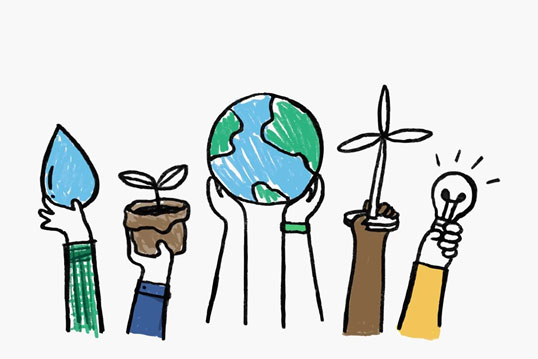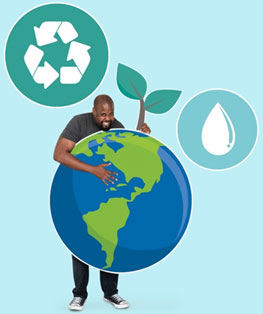Non-Violence at its core is to minimize the harm we inflict on all living beings in our world. The way our world is set up, it is difficult to live a modern life and avoid all harm possible, An easy way to minimize harm is to reduce consumption of products that may harm our fellow humans and animals, a key tenet of sustainability as well. Companies and governments all define sustainability differently, but the United States Environmental Protection Agency discusses sustainability as the following: “Sustainability is based on a simple principle: Everything that we need for our survival and well-being depends, either directly or indirectly, on our natural environment. To pursue sustainability is to create and maintain the conditions under which humans and nature can exist in productive harmony to support present and future generations.”
Jainavenue is a medium to serve the spiritual path of Jainism


To support the protection and maintenance of our planet directly supports the protection of all living beings, the ultimate act of non-violence. Just like the challenges we face with applying Jain nonviolent principles to all aspects of our life, such as sweeping the floor for bugs, or avoiding using cars that may crush living beings, and more, it is impossible to expect that we can also make completely sustainable choices, or that these choices will impact all living beings. However, we are taught in Jainism that our duty is to try to minimize harm as much as we individually can, which I strongly believe is our duty within sustainability as well. We have a duty, not just to living beings, but also to our home planet that supports these beings and on which we in turn rely.
To that end, here are a few simple sustainable individual choices you can make to follow Jain nonviolent principles. Composting food by separating your waste can directly help your immediate surroundings; you can use the compost as natural fertilizer in your garden to support the growth of a plant ecosystem that will house and feed local animals. By removing food waste from regular trash, you also improve the recyclability potential of your waste. When plastic is contaminated with food, it cannot be properly sorted and recycled, and immediately goes to a landfill. The chain effect of this is large; by increasing the amount of waste in our landfills, toxins that leach into the surrounding soil, plants, animals, and human drinking water also increase. Additionally, plastic from these landfills ultimately find their way to the ocean and threaten marine life by proving to be a significant choking or strangling hazard for many fish and other sea creatures. To make simple choices at home in how you reduce and prepare your waste by composting may not save all the landfills or the fish, but the impact of your actions can be felt in your own garden and can make a small change in our overall community.
In a similar vein, considering the types of products you purchase can reduce similar chain effects as described above; think about choosing reusable water bottles over plastic, or investing in dish towels and washing them instead of using paper towels. Save water by turning off the tap when brushing your teeth or save energy by turning off the lights when you are not home. We have all heard the examples before, but by looking at these actions as nonviolent, we can see just how important it is to make these actions just as much a part of our habit as vegetarianism or a prayer.
Outside of just consumption actions, I strongly believe that sharing your thoughts on how you go about reducing your consumption and waste with your family and friends can have a huge ripple effect on your community. Explaining why these basic actions matter to you will encourage others to understand that sustainability isn’t just about which company has a green sticker on its logo or what carbon goal the government sets; it is inherently about taking care of each other and our communities. Sustainability can be an overwhelming word and topic, because we all know that one person’s actions will not be able to change our planet. But by espousing these values with your loved ones, you can build a community that does have the power to make a difference in protecting our planet and all living beings.
Image credits: rawpixel.com on Freepik
About Author
Dharaa Rathi is a digital product strategist at New York Presbyterian hospital and a graduate of New York University. Raised in Richmond, Virginia, she focused her early studies on government and public policy, and regularly volunteers during election cycles to get out the vote in her community. She is passionate about creating a positive impact in her community and spends her time outside of work in reading, cooking, and enjoying New York City.


Well said Dhaara!!